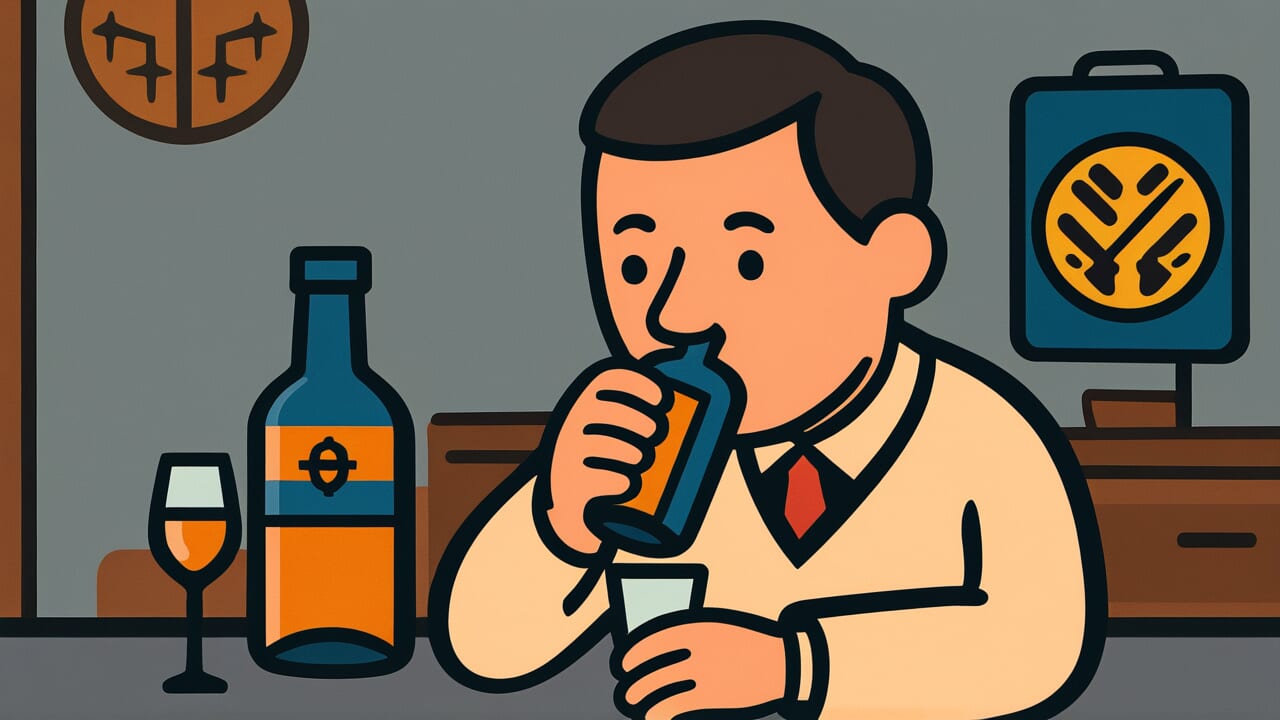How to Read “Do not indulge in alcohol, for it is a maddening drug and not a fine taste”
Sake wo tashinamu nakare, kyōyaku nishite kami ni arazu
Meaning of “Do not indulge in alcohol, for it is a maddening drug and not a fine taste”
This proverb expresses an extremely strong warning. It says alcohol is like a drug that drives people mad, not a delicious drink at all, so you should not drink it.
Today we have sayings like “alcohol is the best medicine,” which support moderate drinking. But this proverb takes a strict stance with no compromise. It demands complete abstinence.
The powerful phrase “maddening drug” captures human weakness. When people drink, they lose their reason and do things they normally would not do.
People use this proverb to strongly warn someone drowning in alcohol. They also use it to discipline themselves.
The teaching is harsh but loving. Do not be fooled by alcohol’s superficial appeal of good taste. Face its fundamental danger directly.
Origin and Etymology
The exact source of this proverb has several possible explanations. The expression “maddening drug” and the strict warning against alcohol suggest influence from Chinese classics or Buddhist scriptures.
The choice of the word “maddening drug” is especially noteworthy. The proverb does not call alcohol simply “poison” but a “drug” that drives people mad.
This shows deep insight. Medicine normally heals people, but used wrongly it becomes harmful. Alcohol has the same dual nature. In moderation, people call it the best medicine. But in excess, it becomes dangerous and destroys reason.
The phrase “not a fine taste” is also interesting. These strong words completely deny alcohol’s deliciousness. But they do not reject the taste itself.
Rather, they warn against being deceived by that deliciousness and losing sight of the truth. Our ancestors sharply perceived the danger lurking behind sweet temptation.
This harsh warning emerged in an era of strong ascetic thought. Alcohol was deeply rooted in people’s lives. The existence of such a severe admonition shows how serious the harm from alcohol was.
Usage Examples
- He keeps the words “Do not indulge in alcohol, for it is a maddening drug and not a fine taste” in his heart and maintains a life without touching a single drop
- “Do not indulge in alcohol, for it is a maddening drug and not a fine taste” is well said, and waves of regret wash over me every time I remember last night’s disgrace
Universal Wisdom
The universal truth this proverb speaks is deep insight about the danger lurking behind pleasure. Throughout history and across cultures, humans are creatures who get drawn to immediate comfort and lose sight of the price that follows.
The temporary euphoria and liberation that alcohol brings is certainly attractive. But in exchange for that momentary pleasure, we surrender reason, our most human ability.
This proverb chose the intense phrase “maddening drug” because it strikes at exactly this essence.
What drives people mad is not necessarily bitter. Rather, because it is sweet, delicious, and comfortable, people let down their guard. Our ancestors saw through this human weakness.
That is why they declared “not a fine taste” to warn against being deceived by superficial appeal. This is not just about alcohol. It applies to gambling, excessive entertainment, and fleeting pleasures of all kinds.
Even as times change, human brain structure does not. The instinct to seek pleasure and avoid pain is carved into our DNA. That is why this proverb has been passed down for hundreds of years.
True happiness does not lie beyond temporary pleasure. The importance of controlling yourself and maintaining reason. That is the unchanging truth this proverb has continued to convey.
When AI Hears This
The human brain has a mechanism called the reward system that judges “this action is advantageous for survival.” When you eat or drink water, the brain releases a substance called dopamine and you feel “good.”
This pleasure becomes motivation to “do the same action again.” But alcohol directly stimulates this reward system and causes massive dopamine release.
Here is the important point. The normal reward system functions as a sensor to judge “what the body really needs.” When your stomach is full, appetite naturally stops. When thirst is quenched, the desire to drink water disappears.
In other words, “fine taste” (truly good things) has automatic brakes built in.
However, alcohol ignores this sensor and forcibly activates only the reward system. It keeps sending “feels good” signals even though the body does not need it. This is the true identity of “maddening drug.”
The brain misrecognizes “this is necessary for survival” and gradually loses its original judgment ability.
Neuroscience research shows brain scans of alcohol-dependent patients. The prefrontal cortex, which governs reason, shows decreased activity. Only the reward system is abnormally activated.
When ancient sages expressed this as “not a fine taste,” they had truly seen through the essence of this “false pleasure.”
Lessons for Today
What this proverb teaches you today is the importance of having eyes that are not deceived by superficial appeal. Modern society overflows with attractive temptations beyond alcohol.
SNS “likes,” the sense of achievement from online games, the excitement of shopping. All feel pleasant temporarily, but taken too far they erode our time, health, and relationships.
What matters is the habit of pausing to think before enjoying something. Will this action truly benefit me? What might I lose as the price of temporary pleasure?
Such calm judgment is the essence this proverb wanted to convey.
You do not need complete abstinence. But having the power to control yourself and not surrendering reason leads to true freedom.
Flowing with temptation is easy. But continuing to hold the rudder of your own life is real strength, is it not? You have that power.
Have the courage to say “no” to the sweet invitations before you.



Comments